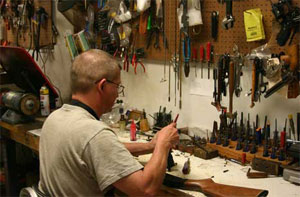Gunsmith
Tasks & duties

Gunsmiths may do some or all of the following:
-
design firearms
-
give advice to clients about the design, repair or alteration of their firearms
-
select and prepare metal and wood for making and repairing firearms
-
use machines to cut and shape metal, wood and composites
-
make the checkering (ornamentation) on firearms
-
diagnose faults
-
fit and repair firearms
-
research information about particular firearms
-
clean, conserve and restore firearms
-
overhaul, assemble and test firearms
-
establish and manage a shooting range for testing firearms
-
carry out valuations on firearms
-
make tools to clean, repair and service firearms
-
understand and practise safety with firearms and ammunition
Specialisations
Gunsmiths may choose to specialise in either civilian or military weaponry. Gunsmiths working with military weaponry are usually employed by the defence forces or the police and may be called armourers.
Skills & knowledge

Gunsmiths need to have:
-
good toolmaking, fitting and welding skills
-
an understanding of the properties of metal for using precision machinery and assembling ammunition
-
knowledge of the working mechanisms of different models and makes of firearms
-
knowledge of firearm restoration and conservation
-
the ability to produce a firearm or firearm parts by hand or by using machinery
-
knowledge of dismantling, inspecting, assembling and testing firearm components safely
-
good maths skills, including geometry and physics
-
small business skills if they are self-employed
Entry requirements
To become a gunsmith you must undergo a police security check, gain an 'A' firearms licence and any relevant endorsements required for a restricted or pistol weapon, and complete an apprenticeship.
NZ Society of Gunsmiths website – information on courses
Gunsmiths who own their own business must hold an arms dealer's licence 'D'.
Secondary education
Gunsmiths need to have School Certificate or NCEA equivalent English, maths and science.
Training on the job
Skills are gained on the job. Apprentices study unit standards that can be credited towards the National Certificate in Gunsmithing – Levels 4 and 5. The New Zealand Society of Gunsmiths administers the national certificate and runs courses in related areas such as arms conservation and restoration, hand forging, arms maintenance and diagnostics, ammunition advice and firearms safety.
The defence forces also offer training.
- Royal NZ Air Force website – information about becoming an armament technician
- NZ Army website – information about training as an armourer
Useful experience
Experience with woodworking, using hand tools, working with metals and machines, or jobs in mechanical engineering are useful for gunsmiths. It is also useful to have experience handling firearms, hunting or target shooting.
Related courses
Mechanical Engineering
Metal Fitting, Turning and Machining
For more information, please refer to Career Services.
Document Actions
